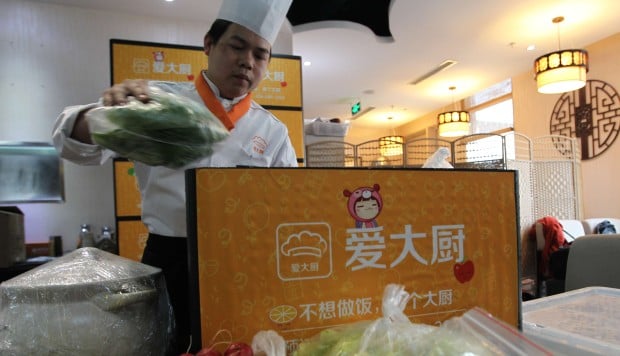
 There are many traditional holidays in China, but the Lunar New Year holiday, or Spring Festival as it is known locally, is top of the list in Chinese culture. It is the time when hundreds of millions of working urban dwellers return home for get-together moments with their families. To pull that off, hard-to-get train or plane tickets have to be booked at least one month in advance. Food, fruit, wine and candy are often prepared in advance by loving parents in order to give their children a once-a-year family feast. But increasingly in the era of the mobile internet, in which app-enabled on-demand services such as Uber Technologies and Airbnb have changed people’s everyday life, celebrating the Spring Festival is becoming less traditional and more innovative by linking supply and demand in ways not possible before. Here are some popular ways mainland Chinese are celebrating an “on-demand” Lunar New Year. Days of shopping for ingredients, hours of preparation and toiling in the kitchen are so very 2008. ( ) has 1,000 professional chefs at the beck and call of a smartphone swipe, ready to cook up a storm on site in a customer’s home. Ingredients are purchased the day before the banquet so all the customer needs to do is focus on playing gracious host, sit back and enjoy. A 16-course iDachu Spring Festival banquet for 10 people is priced between 1,888 yuan (HK$2,129) and 3,588 yuan. The service said it has received 3,000 orders weeks in advance. “The service is getting increasing popular among middle-class families, especially those who have ageing parents and young kids,” said Chang Huan, the Beijing startup’s operations manager.
There are many traditional holidays in China, but the Lunar New Year holiday, or Spring Festival as it is known locally, is top of the list in Chinese culture. It is the time when hundreds of millions of working urban dwellers return home for get-together moments with their families. To pull that off, hard-to-get train or plane tickets have to be booked at least one month in advance. Food, fruit, wine and candy are often prepared in advance by loving parents in order to give their children a once-a-year family feast. But increasingly in the era of the mobile internet, in which app-enabled on-demand services such as Uber Technologies and Airbnb have changed people’s everyday life, celebrating the Spring Festival is becoming less traditional and more innovative by linking supply and demand in ways not possible before. Here are some popular ways mainland Chinese are celebrating an “on-demand” Lunar New Year. Days of shopping for ingredients, hours of preparation and toiling in the kitchen are so very 2008. ( ) has 1,000 professional chefs at the beck and call of a smartphone swipe, ready to cook up a storm on site in a customer’s home. Ingredients are purchased the day before the banquet so all the customer needs to do is focus on playing gracious host, sit back and enjoy. A 16-course iDachu Spring Festival banquet for 10 people is priced between 1,888 yuan (HK$2,129) and 3,588 yuan. The service said it has received 3,000 orders weeks in advance. “The service is getting increasing popular among middle-class families, especially those who have ageing parents and young kids,” said Chang Huan, the Beijing startup’s operations manager.
Continue reading...

